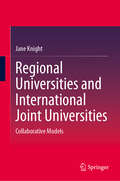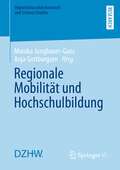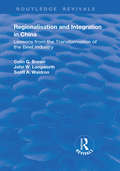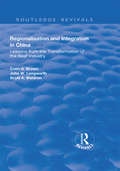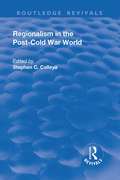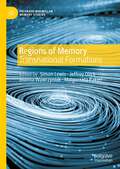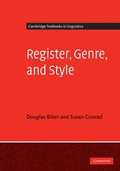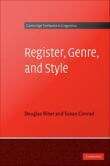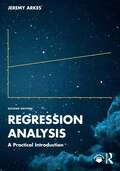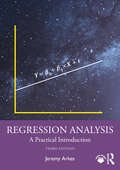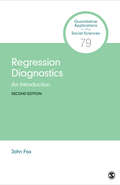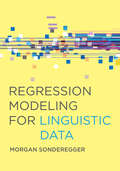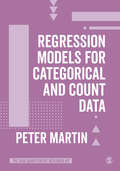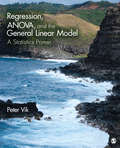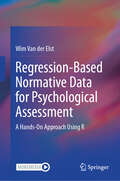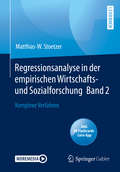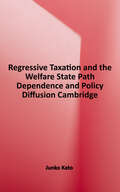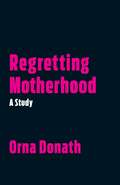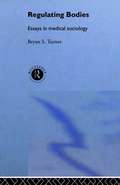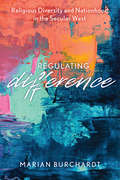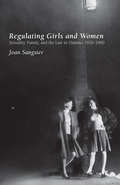- Table View
- List View
Regional Universities and International Joint Universities: Collaborative Models
by Jane KnightThis book offers an in-depth analysis of two collaborative models of international higher education institutions: international joint universities (IJUs) and supranational regional universities (RUs). They are based on close partnerships among countries and institutions and thus differ from the single state university model as well as international branch campuses or franchise universities. Key features of these institutions are examined through the use of conceptual frameworks and ten in-depth case studies from all regions of the world. Distinguishing characteristics such as shared governance and management practices; collaborative academic programs and the development of joint laboratories, research networks, and centers of excellence are analyzed. A study of the driving rationales for IJUs and RUs reveals commonalities and stark differences. While international joint universities are commonly single campus institutions, regional universities can be single, multiple campus or virtual. IJUs and RUs are understudied phenomena as more attention and research is focused on the rise of international branch campuses. Academic leaders, policy makers, higher education scholars and students will benefit from the analysis of the key features, rationales and benefits of international collaborative university models and how they can contribute to 1) providing increased and diversified access to education, 2) promote regional identity and facilitate bilateral and regional collaboration for education, research and innovation; 3) contribute to stronger regional and international relations between countries through knowledge diplomacy; and 4) address contemporary global and regional issues. At the same time, it is important to acknowledge potential risks and uncertainties related to quality assurance, qualification recognition, financial stability, research integrity, knowledge security, and sustainability that can be linked to collaborative models of international higher education institutions.
Regional and Urban Change and Geographical Information Systems and Science: An Analysis of Ontario, Canada (Advances in Geographic Information Science)
by Eric VazThis book presents a systematic analysis of challenges in the field of Geographical Information Systems and Science, geographical analysis, and regional science for Ontario, one of the fastest-changing provinces in Canada and one of North America's largest economic hubs. In nine chapters, the book offers advanced spatial analysis techniques and digital data content to integrate Geographic Information Systems (GIS) as tools to tackle regional and urban challenges. The chapters address the following main topics: 1) state-of-the-art approaches for regional discrepancies, 2) investigations of available methods for advanced spatial analysis, 3) identification of regional patterns and land use dynamics, 4) availability of Web 3.0 data content for regions without standardized data, and 5) the limitations and challenges of urbanization and its impact on landscape, heritage and ecosystems. The volume is divided into four sections dealing with key issues in Ontario, each addressing the use of GIS for crucial regional decision-making. The book will be of interest to researchers, undergraduate and graduate students, planners, regional scientists, and policy makers.
Regionale Mobilität und Hochschulbildung (Higher Education Research and Science Studies)
by Monika Jungbauer-Gans Anja GottburgsenHochschulbildung ist ein wichtiger Motor interregionaler und internationaler Mobilität. Denn in vielen Fällen ist die Entscheidung für ein Studium gleichzeitig auch eine Mobilitätsentscheidung. Weitere Übergänge und damit typische Gelegenheiten für regionale Mobilität sind der Übergang vom Bachelor- in ein Masterstudium, der erste Eintritt von Absolvent*innen in den Arbeitsmarkt oder die regionale Mobilität von Hochqualifizierten im weiteren Lebens- und Berufsverlauf. Die aktuellen Befunde in diesem Sammelband belegen die Einflussfaktoren auf regionale Mobilität – sowohl auf Seite der Individuen und ihrer individuellen und sozialen Ressourcen als auch auf Seite der Hochschulen und der strukturellen Merkmale des Arbeitsmarktes für Hochqualifizierte.
Regionalisation and Integration in China: Lessons from the Transformation of the Beef Industry (Routledge Revivals Ser.)
by Scott Waldron Colin Brown John LongworthThis title was first published in 2002: Changing economic, institutional and market environments have turned the spatial inter-relationships thought to exist in China upside-down. Through an investigation of the beef industry, this text builds a picture of where regionalization and integration are heading in China. It examines the impacts of market forces, industry characteristics, relative factor endowments and government influence on the spatial organization of activities. It reveals the influence of government as priorities are re-assessed and as markets and industries develop, as well as exploring the extent of regional co-ordination and co-operation and how central and local government policies and strategies reconcile. The volume also contains regional assessments of the beef industry in 12 key producing provinces and the key consumption areas of Beijing, Shanghai and Hong Kong.
Regionalisation and Integration in China: Lessons from the Transformation of the Beef Industry (Routledge Revivals)
by Colin G Brown John W Longworth Scott A WaldronThis title was first published in 2002: Changing economic, institutional and market environments have turned the spatial inter-relationships thought to exist in China upside-down. Through an investigation of the beef industry, this text builds a picture of where regionalization and integration are heading in China. It examines the impacts of market forces, industry characteristics, relative factor endowments and government influence on the spatial organization of activities. It reveals the influence of government as priorities are re-assessed and as markets and industries develop, as well as exploring the extent of regional co-ordination and co-operation and how central and local government policies and strategies reconcile. The volume also contains regional assessments of the beef industry in 12 key producing provinces and the key consumption areas of Beijing, Shanghai and Hong Kong.
Regionalism in the Post-Cold War World
by Stephen C. CalleyaThis title was first published in 2000: This text describes, analyzes and projects the implications of regionalism on contemporary international relations. Regional policy positions are examined in order to increase our understanding of how the direct impact patterns of relations at a regional level of analysis are having in the shifting balance of international power. The book clarifies what types of regional dynamics are manifesting themselves in different parts of the world, and consists of both theoretical and empirical assessments (similar to those developed in the author's previous book on regionalism) that ensures that the comparative analysis conducted is a comprehensive and coherent one.
Regions of Memory: Transnational Formations (Palgrave Macmillan Memory Studies)
by Simon Lewis Jeffrey Olick Joanna Wawrzyniak Malgorzata Pakier“Regions of memory” are a scale of social and cultural memory that reaches above the national, yet remains narrower than the global or universal. The chapters of this volume analyze transnational constellations of memory across and between several geographical areas, exploring historical, political and cultural interactions between societies. Such a perspective enables a more diverse field of possible comparisons in memory studies, studying a variety of global memory regions in parallel. Moreover, it reveals lesser-known vectors and mechanisms of memory travel, such as across Cold War battle lines, across the Indian Ocean, or between Southeast Asia and western Europe.Chapters 1 and 6 are available open access under a Creative Commons Attribution 4.0 International License via link.springer.com.
Register, Genre, and Style
by Douglas Biber Susan ConradThis book describes the most important kinds of texts in English and introduces the methodological techniques used to analyse them. Three analytical approaches are introduced and compared, describing a wide range of texts from the perspectives of register, genre and style. The primary focus of the book is on the analysis of registers. Part 1 introduces an analytical framework for studying registers, genre conventions, and styles. Part 2 provides detailed descriptions of particular text varieties in English, including spoken interpersonal varieties (conversation, university office hours, service encounters), written varieties (newspapers, academic prose, fiction), and emerging electronic varieties (e-mail, internet forums, text messages). Finally, Part 3 introduces advanced analytical approaches using corpora, and discusses theoretical concerns, such as the place of register studies in linguistics, and practical applications of register analysis. Each chapter ends with three types of activities: reflection and review activities, analysis activities, and larger project ideas.
Register, Genre, and Style
by Douglas Biber Susan ConradThis book describes the most important kinds of texts in English and introduces the methodological techniques used to analyse them. Three analytical approaches are introduced and compared, describing a wide range of texts from the perspectives of register, genre and style. The primary focus of the book is on the analysis of registers. Part 1 introduces an analytical framework for studying registers, genre conventions, and styles. Part 2 provides detailed descriptions of particular text varieties in English, including spoken interpersonal varieties (conversation, university office hours, service encounters), written varieties (newspapers, academic prose, fiction), and emerging electronic varieties (e-mail, internet forums, text messages). Finally, Part 3 introduces advanced analytical approaches using corpora, and discusses theoretical concerns, such as the place of register studies in linguistics, and practical applications of register analysis. Each chapter ends with three types of activities: reflection and review activities, analysis activities, and larger project ideas.
Regression Analysis: A Practical Introduction
by Jeremy ArkesThis thoroughly practical and engaging textbook is designed to equip students with the skills needed to undertake sound regression analysis without requiring high-level math. Regression Analysis covers the concepts needed to design optimal regression models and to properly interpret regressions. It details the most common pitfalls, including three sources of bias not covered in other textbooks. Rather than focusing on equations and proofs, the book develops an understanding of these biases visually and with examples of situations in which such biases could arise. In addition, it describes how ‘holding other factors constant’ actually works and when it does not work. This second edition features a new chapter on integrity and ethics, and has been updated throughout to include more international examples. Each chapter offers examples, exercises, and clear summaries, all of which are designed to support student learning to help towards producing responsible research. This is the textbook the author wishes he had learned from, as it would have helped him avoid many research mistakes he made in his career. It is ideal for anyone learning quantitative methods in the social sciences, business, medicine, and data analytics. It will also appeal to researchers and academics looking to better understand regressions. Additional digital supplements are available at: www.youtube.com/channel/UCenm3BWqQyXA2JRKB_QXGyw.
Regression Analysis: A Practical Introduction
by Jeremy ArkesThis thoroughly practical and engaging textbook conveys the skills needed to responsibly develop, conduct, scrutinize, and interpret statistical analyses, without requiring any high-level math.Regression Analysis details the most common sources of statistical biases, including some not covered in other textbooks. Rather than focusing on complicated equations, the book describes these biases visually and with examples of situations in which they could arise. As the author argues, just learning how to conduct regressions without learning how to properly assess and interpret regressions can do more harm than good. Other unique features include an innovative approach to describing the elusive concept of "holding other factors constant" and proper interpretations of the strength of evidence in light of the Bayesian critique of hypothesis testing. This third edition enhances the emphasis on ethical and responsible research practices and creates more examples demonstrating how the biases and their corrections could affect the regression results.This is the textbook the author wishes he had learned from, as it would have helped him avoid many research mistakes he made in his career at research organizations and in academia. It is ideal for undergraduate and postgraduate students learning quantitative methods in the social sciences, business, medicine, and data analytics. It will also appeal to researchers and academics looking to better understand regressions.
Regression Diagnostics: An Introduction (Quantitative Applications in the Social Sciences #79)
by Dr. John FoxRegression diagnostics are methods for determining whether a regression model that has been fit to data adequately represents the structure of the data. For example, if the model assumes a linear (straight-line) relationship between the response and an explanatory variable, is the assumption of linearity warranted? Regression diagnostics not only reveal deficiencies in a regression model that has been fit to data but in many instances may suggest how the model can be improved. The Second Edition of this bestselling volume by John Fox considers two important classes of regression models: the normal linear regression model (LM), in which the response variable is quantitative and assumed to have a normal distribution conditional on the values of the explanatory variables; and generalized linear models (GLMs) in which the conditional distribution of the response variable is a member of an exponential family. R code and data sets for examples within the text can be found on an accompanying website at https://tinyurl.com/RegDiag.
Regression Diagnostics: An Introduction (Quantitative Applications in the Social Sciences #79)
by Dr. John FoxRegression diagnostics are methods for determining whether a regression model that has been fit to data adequately represents the structure of the data. For example, if the model assumes a linear (straight-line) relationship between the response and an explanatory variable, is the assumption of linearity warranted? Regression diagnostics not only reveal deficiencies in a regression model that has been fit to data but in many instances may suggest how the model can be improved. The Second Edition of this bestselling volume by John Fox considers two important classes of regression models: the normal linear regression model (LM), in which the response variable is quantitative and assumed to have a normal distribution conditional on the values of the explanatory variables; and generalized linear models (GLMs) in which the conditional distribution of the response variable is a member of an exponential family. R code and data sets for examples within the text can be found on an accompanying website at https://tinyurl.com/RegDiag.
Regression Modeling for Linguistic Data
by Morgan SondereggerThe first comprehensive textbook on regression modeling for linguistic data offers an incisive conceptual overview along with worked examples that teach practical skills for realistic data analysis.In the first comprehensive textbook on regression modeling for linguistic data in a frequentist framework, Morgan Sonderegger provides graduate students and researchers with an incisive conceptual overview along with worked examples that teach practical skills for realistic data analysis. The book features extensive treatment of mixed-effects regression models, the most widely used statistical method for analyzing linguistic data. Sonderegger begins with preliminaries to regression modeling: assumptions, inferential statistics, hypothesis testing, power, and other errors. He then covers regression models for non-clustered data: linear regression, model selection and validation, logistic regression, and applied topics such as contrast coding and nonlinear effects. The last three chapters discuss regression models for clustered data: linear and logistic mixed-effects models as well as model predictions, convergence, and model selection. The book&’s focused scope and practical emphasis will equip readers to implement these methods and understand how they are used in current work.The only advanced discussion of modeling for linguistsUses R throughout, in practical examples using real datasetsExtensive treatment of mixed-effects regression modelsContains detailed, clear guidance on reporting modelsEqual emphasis on observational data and data from controlled experimentsSuitable for graduate students and researchers with computational interests across linguistics and cognitive science
Regression Models for Categorical and Count Data (The SAGE Quantitative Research Kit)
by Peter MartinThis text provides practical guidance on conducting regression analysis on categorical and count data. Step by step and supported by lots of helpful graphs, it covers both the theoretical underpinnings of these methods as well as their application, giving you the skills needed to apply them to your own research. It offers guidance on: · Using logistic regression models for binary, ordinal, and multinomial outcomes · Applying count regression, including Poisson, negative binomial, and zero-inflated models · Choosing the most appropriate model to use for your research · The general principles of good statistical modelling in practice Part of The SAGE Quantitative Research Kit, this book will give you the know-how and confidence needed to succeed on your quantitative research journey
Regression Models for Categorical and Count Data (The SAGE Quantitative Research Kit)
by Peter MartinThis text provides practical guidance on conducting regression analysis on categorical and count data. Step by step and supported by lots of helpful graphs, it covers both the theoretical underpinnings of these methods as well as their application, giving you the skills needed to apply them to your own research. It offers guidance on: · Using logistic regression models for binary, ordinal, and multinomial outcomes · Applying count regression, including Poisson, negative binomial, and zero-inflated models · Choosing the most appropriate model to use for your research · The general principles of good statistical modelling in practice Part of The SAGE Quantitative Research Kit, this book will give you the know-how and confidence needed to succeed on your quantitative research journey
Regression Models for Categorical, Count, and Related Variables: An Applied Approach
by Dr John P. HoffmannSocial science and behavioral science students and researchers are often confronted with data that are categorical, count a phenomenon, or have been collected over time. Sociologists examining the likelihood of interracial marriage, political scientists studying voting behavior, criminologists counting the number of offenses people commit, health scientists studying the number of suicides across neighborhoods, and psychologists modeling mental health treatment success are all interested in outcomes that are not continuous. Instead, they must measure and analyze these events and phenomena in a discrete manner. This book provides an introduction and overview of several statistical models designed for these types of outcomes--all presented with the assumption that the reader has only a good working knowledge of elementary algebra and has taken introductory statistics and linear regression analysis. Numerous examples from the social sciences demonstrate the practical applications of these models. The chapters address logistic and probit models, including those designed for ordinal and nominal variables, regular and zero-inflated Poisson and negative binomial models, event history models, models for longitudinal data, multilevel models, and data reduction techniques such as principal components and factor analysis. Each chapter discusses how to utilize the models and test their assumptions with the statistical software Stata, and also includes exercise sets so readers can practice using these techniques. Appendices show how to estimate the models in SAS, SPSS, and R; provide a review of regression assumptions using simulations; and discuss missing data. A companion website includes downloadable versions of all the data sets used in the book.
Regression, ANOVA, and the General Linear Model: A Statistics Primer
by Peter Wright VikPeter Vik′s Regression, ANOVA, and the General Linear Model: A Statistics Primer demonstrates basic statistical concepts from two different perspectives, giving the reader a conceptual understanding of how to interpret statistics and their use. The two perspectives are (1) a traditional focus on the t-test, correlation, and ANOVA, and (2) a model-comparison approach using General Linear Models (GLM). This book juxtaposes the two approaches by presenting a traditional approach in one chapter, followed by the same analysis demonstrated using GLM. By so doing, students will acquire a theoretical and conceptual appreciation for data analysis as well as an applied practical understanding as to how these two approaches are alike.
Regression-Based Normative Data for Psychological Assessment: A Hands-On Approach Using R
by Wim Van der ElstOver the last 20 years, so-called regression-based normative methods have become increasingly popular. In this approach, regression models for the mean and the residual variance structure are used to derive the normative data. The regression-based normative approach has some important advantages over the traditional normative approach, e.g., it allows for deriving more fine-grained norms and typically requires a substantially smaller sample size to derive accurate norms. This book focuses on regression-based methods to derive normative data. The target audience are psychologists and other researchers in the behavioral sciences who are interested in deriving normative data for psychological tests (e.g., cognitive tests, questionnaires, rating scales, etc.). The book provides the essential theoretical background that is needed to understand the methodology, with a strong emphasis on the practical/real-life application of the methodology. To this end, the book is also accompanied by an open-source software package (the R library NormData) that is used to exemplify how normative data can be derived in several case studies.
Regressionsanalyse in der empirischen Wirtschafts- und Sozialforschung Band 2: Komplexe Verfahren
by Matthias-W. StoetzerDieses Lehrbuch ist der Folgeband zu „Regressionsanalyse in der empirischen Wirtschafts- und Sozialforschung Band 1“. Es richtet sich an Studierende und Wissenschaftler, die im Rahmen einer Forschungsarbeit Daten analysieren oder vorhandene empirische Publikationen auswerten müssen. Regressionsanalysen stellen die wichtigsten Verfahren zur Untersuchung empirischer Fragestellungen in den Wirtschafts- und Sozialwissenschaften dar. Im Unterschied zu anderen ökonometrischen oder statistischen Lehrbüchern verzichtet der Autor auf abschreckende mathematische Ausführungen. Alle Aspekte werden verbal und grafisch erläutert. Die Kapitel sind so aufgebaut, dass ein selbständiges Studium problemlos möglich ist. Lesende werden Schritt für Schritt in komplexere Verfahren eingeführt.Dabei sind sämtlichen Kapiteln die wichtigsten Lernziele und Schlüsselbegriffe vorangestellt. Jedes Kapitel schließt mit einer Reihe von Übungsaufgaben einschließlich Lösungen. Praxisorientiert werden alle Regressionsverfahren und Tests anhand der Statistikprogramme SPSS und Stata sowie mittels Screenshots erklärt. Zusätzliche Fragen per AppLaden Sie die Springer Nature Flashcards-App kostenlos herunter und nutzen Sie exklusives Zusatzmaterial, um Ihr Wissen zu prüfen.
Regressive Taxation and the Welfare State: Path Dependence and Policy Diffusion (Cambridge Studies in Comparative Politics)
by Junko KatoPolitical economists have viewed large public expenditures as a product of leftist government and the expression of a stronger representation of labor interest. The formation of governments' funding bases is a topic that has not been thoroughly explored, and this book sheds important new light on the issue of taxes and welfare. Beginning with a clarification of the development of postwar tax policies in industrial democracies, Junko Kato finds that the differentiation of tax revenue structure is path-dependent upon the shift to regressive taxation. Kato challenges the conventional belief that progressive taxation leads to large public expenditures in mature welfare states.
Regretting Motherhood: A Study
by Orna DonathWomen who opt not to be mothers are frequently warned that they will regret their decision later in life, yet we rarely talk about the possibility that the opposite might also be true—that women who have children might regret it. Drawing on years of research interviewing women from a variety of socioeconomic, educational, and professional backgrounds, sociologist Orna Donath treats regret as a feminist issue: as regret marks the road not taken, we need to consider whether alternative paths for women currently are blocked off. She asks that we pay attention to what is forbidden by rules governing motherhood, time, and emotion, including the cultural assumption that motherhood is a “natural” role for women—for the sake of all women, not just those who regret becoming mothers. If we are disturbed by the idea that a woman might regret becoming a mother, Donath says, our response should not be to silence and shame these women; rather, we need to ask honest and difficult questions about how society pushes women into motherhood and why those who reconsider it are still seen as a danger to the status quo. Groundbreaking, thoughtful, and provocative, this is an especially needed book in our current political climate, as women's reproductive rights continue to be at the forefront of national debates.
Regulating Bodies: Essays in Medical Sociology
by Bryan S. Turner Professor Bryan TurnerBryan Turner is generally acknowledged to have been the key figure in opening up the sociological debate about the body. In this coruscating and fascinating book he shows how his thinking on the subject has developed and why sociologists must take the body seriously.
Regulating Difference: Religious Diversity and Nationhood in the Secular West
by Marian BurchardtTransnational migration has contributed to the rise of religious diversity and has led to profound changes in the religious make-up of society across the Western world. As a result, societies and nation-states have faced the challenge of crafting ways to bring new religious communities into existing institutions and the legal frameworks. Regulating Difference explores how the state regulates religious diversity and examines the processes whereby religious diversity and expression becomes part of administrative landscapes of nation-states and people’s everyday lives. Arguing that concepts of nationhood are key to understanding the governance of religious diversity, Regulating Difference employs a transatlantic comparison of the Spanish region of Catalonia and the Canadian province of Quebec to show how processes of nation-building, religious heritage-making and the mobilization of divergent interpretations of secularism are co-implicated in shaping religious diversity. It argues that religious diversity has become central for governing national and urban spaces.
Regulating Girls and Women
by Joan SangsterFor people living in Ontario, as throughout Canada, the period from 1920 to 1960 was one of great change and turmoil - the roaring twenties the Great Depression, the upheaval of war, and the economic boom of the postwar years. One constant in society over those years, however, was the differential treatment that females and males received before the law, especially in regard to family matters and sexuality. A patriarchal justice system, increasingly under the influence of 'expert' opinion from social workers, psychologists, psychiatrists, and other medial doctors, openly espoused a sexual double standard and sough to regulate the behaviour of girls and women 'for their own good'. Indeed, women in physically abusive relationships were at times advised by judges, probation officers, and social workers to 'go home and sleep with your husband' on the assumption that keeping him sexually sated would end the violence.In this fascinating study of sexuality, family, and the law, historian Joan Sangster focuses on key issues that drew women into the courts, as plaintiffs and defendants: incest and sexual abuse, wife assault, prostitution, female delinquency, and the unique 'colonization of the soul' that Aboriginal women had to endure before the law. As Sangster writes: 'While history does not offer pat solutions to present dilemmas, it may stimulate some sobering second thoughts on current debates - by dissecting the changing definitions of criminality and the process by which law constituted gender, race, and class relations; by mounting a critique of past reform efforts; and, importantly, by suggesting how the law affected the lives of girls and women who came into conflict with it.'
